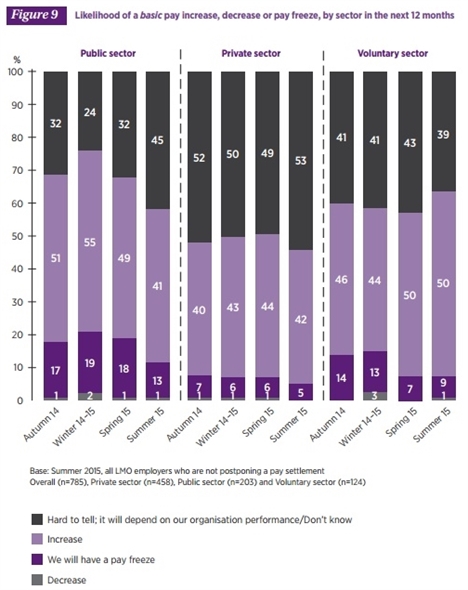10.08.15
Fewer public sector employers planning pay rises for staff
The proportion of public sector employers planning a basic pay increase for staff has fallen again as uncertainty in the sector rises.
But the number of employers planning a pay freeze has also fallen since Q1 (from 18% to 13%). In fact, nearly half of public sector employers (45%) are unsure whether their organisation will be able to provide a basic pay increase, decrease or pay freeze in the next 12 months, according to new figures.
The Chartered Institute of Personnel and Development’s (CIPD’s) latest ‘Labour Market Outlook’ report revealed that those 45% of public sector employers said it was ‘hard to tell’ – depending on the organisation’s performance. This is a significant increase from the 32% recorded in the spring survey.

The proportion of public sector employers that say they will provide a basic pay increase in the next 12 months has dropped to 41%. Previously, the figure had stood at 49% in spring 2015 and 55% in winter 2014-15.
The proportion of public sector employers that say they will provide a pay freeze in the 12 months to June 2016 is more than one in 10 (13%), compared with just one in twenty (5%) in private sector companies.
Gerwyn Davies, labour market analyst at the CIPD, said: “At one end of the spectrum, workers in occupations where there are skills or labour shortages and thriving sectors such as finance and construction seem likely to get pay increases well above current inflation [3% or above].
“However, at the other end of the scale, many workers in areas such as manufacturing and public sector, are seeing only a very modest increase in living standards. In-between, the bulk of workers will continue to see moderate growth in their pay packets but with inflation expected to stay low, they should still feel the benefit of any increases.”
The CIPD survey, based on responses from 931 HR professionals and employers, revealed that pay restraint in the public sector remains the most significant reason why employers cannot match the inflation rate of 2% in their pay award. In addition, one third (33%) of employers cite affordability.
Last month, during the chancellor’s Budget Speech, George Osborne announced that the government will only fund public sector workforces for a pay award of 1% for four years from 2016-17 onwards.
But the widely respected Institute for Fiscal Studies warned that capping public sector pay increases at 1% for four years could make it “harder to recruit and retain” quality workers.